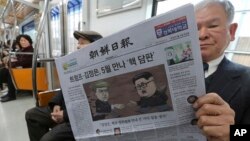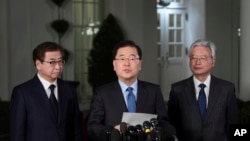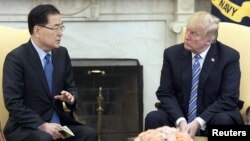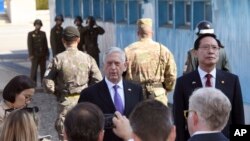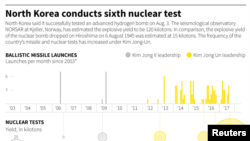As President Donald Trump embarks on an unprecedented diplomatic mission to end North Korea’s nuclear program, he faces complex, unresolved issues, according to former U.S. officials and analysts who have dealt with North Korea extensively.
The White House announced Thursday that Trump had accepted North Korean leader Kim Jong Un’s invitation to discuss the country’s nuclear program, reviving hopes for breaking a diplomatic stalemate between the United States and North Korea that has lasted nearly a decade.
Resolving the nuclear dilemma presented by North Korea is something that has eluded Trump’s predecessors for more than a quarter-century.
The summit, if it happens, would give Trump a better chance than they had to solve one of the world’s most intractable problems.
A welcome announcement
Ken Gause, director of the International Affairs Group at the Center for Naval Analyses, welcomed the announcement, calling it “extraordinary and historical.”
Alexander Vershbow, who served as the U.S. ambassador to Seoul during the George W. Bush administration, said the acceptance of the invitation was “the right thing for President Trump to do.”
Vershbow added Pyongyang had met Washington’s conditions for the resumption of nuclear negotiations, referring to Kim’s promise to denuclearize and refrain from any further nuclear and missile tests while talks are underway.
Kim extended the invitation through South Korean special envoys, and Trump agreed he would meet with the North Korean leader by May, a timeframe that raised concern among some analysts in Washington.
Closer, not the opener
“I am concerned by President Trump’s response to the invitation that he meet with Kim Jong Un — not that he agreed to meet, but that he agreed to meet by May,” said Robert Einhorn, a special adviser for nonproliferation and arms control in former President Barack Obama’s administration.
Einhorn believes Trump should have agreed to lower-level exploratory talks that “could test North Korea’s seriousness.”
A senior Trump administration official defended the president’s decision, arguing previous lower-level talks have failed.
“President Trump was elected in part because he is willing to … take approaches, very, very different from past approaches and past presidents,” the official said.
Some experts are cautioning against over-optimism about the prospects for a breakthrough, questioning the North’s sincerity toward denuclearization.
“I fear Trump is walking onto a North Korea trap,” Robert Manning, a senior fellow at the Atlantic Council, said. “A summit should be at the end of a process of denuclearization, not be based on good faith that Kim will actually denuclearize.”
Scott Snyder, senior fellow for Korea studies at the Council on Foreign Relations, said he thinks the possible summit “would only mark the opening of a process,” during which Washington and Pyongyang might try to resolve the issue, which would pose a “challenge” to the U.S.
“From the U.S. perspective, the work of the president should be the closure. It’s rare for the president to be the opener,” Snyder said.
Kim sees US threat
In the past, North Korea has demanded the U.S. end what Pyongyang calls “hostile policy” in return for denuclearization.
Evans Revere, a former State Department official with extensive experience negotiating with North Korea, said Pyongyang sees a threat in the presence of U.S. troops in the South and the U.S. nuclear umbrella over Seoul and Tokyo.
The latest diplomatic overture between the U.S. and North Korea came after Kim reached out to Seoul to offer to send a delegation to the Winter Olympics in the South.
Kim dispatched his sister Kim Yo Jong to the games to invite South Korean President Moon Jae-in to Pyongyang. Moon’s special envoys traveled to Pyongyang and met with Kim Jong Un, where the two sides agreed to hold an inter-Korean summit in late April.
Keep promise
On Friday, the White House pressed the North to keep its promise to denuclearize.
“We are not going to have this meeting take place until we see concrete actions that match the words and the rhetoric of North Korea,” White House spokeswoman Sarah Huckabee Sanders told reporters.
Christy Lee from VOA Korean Service contributed to this story.




